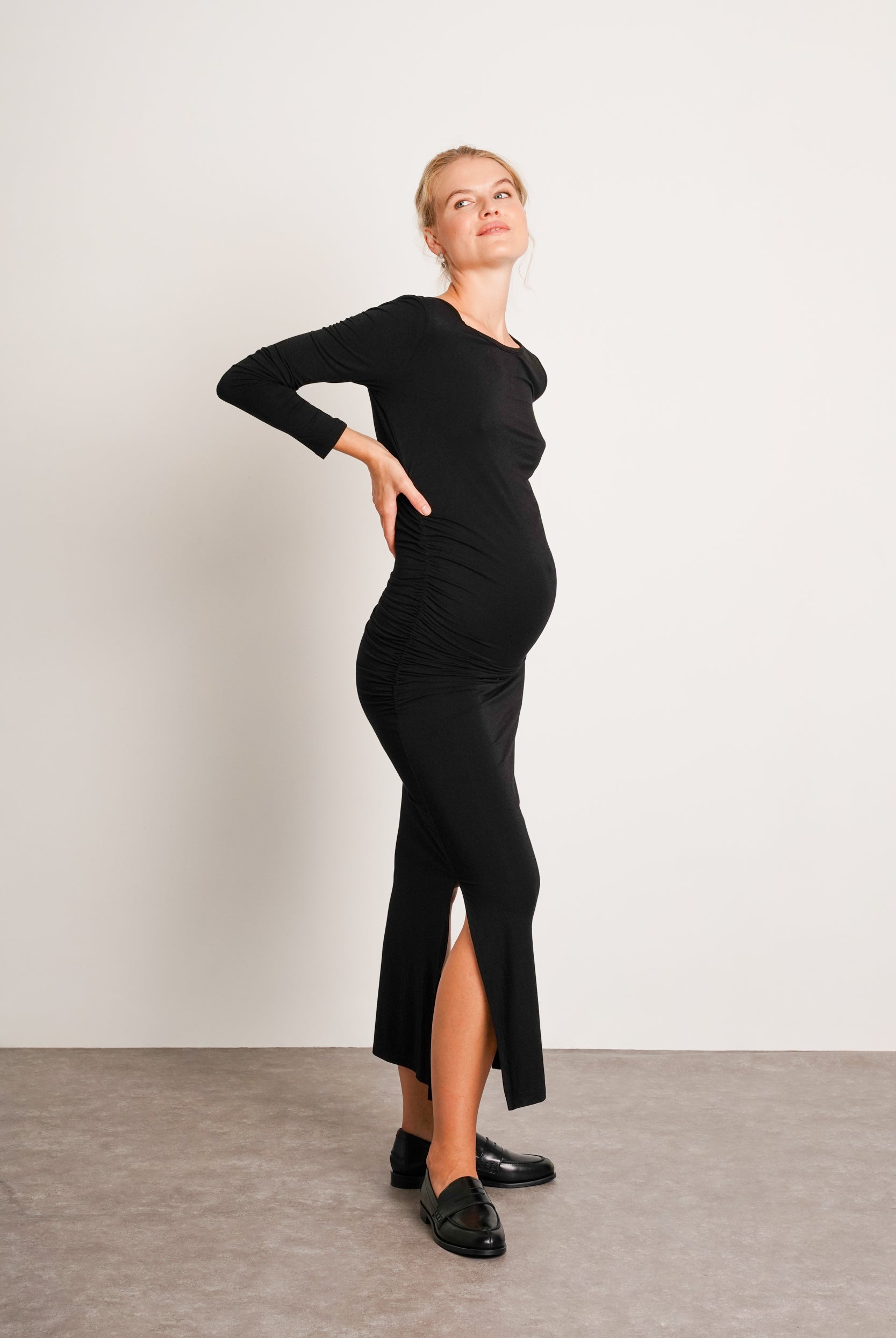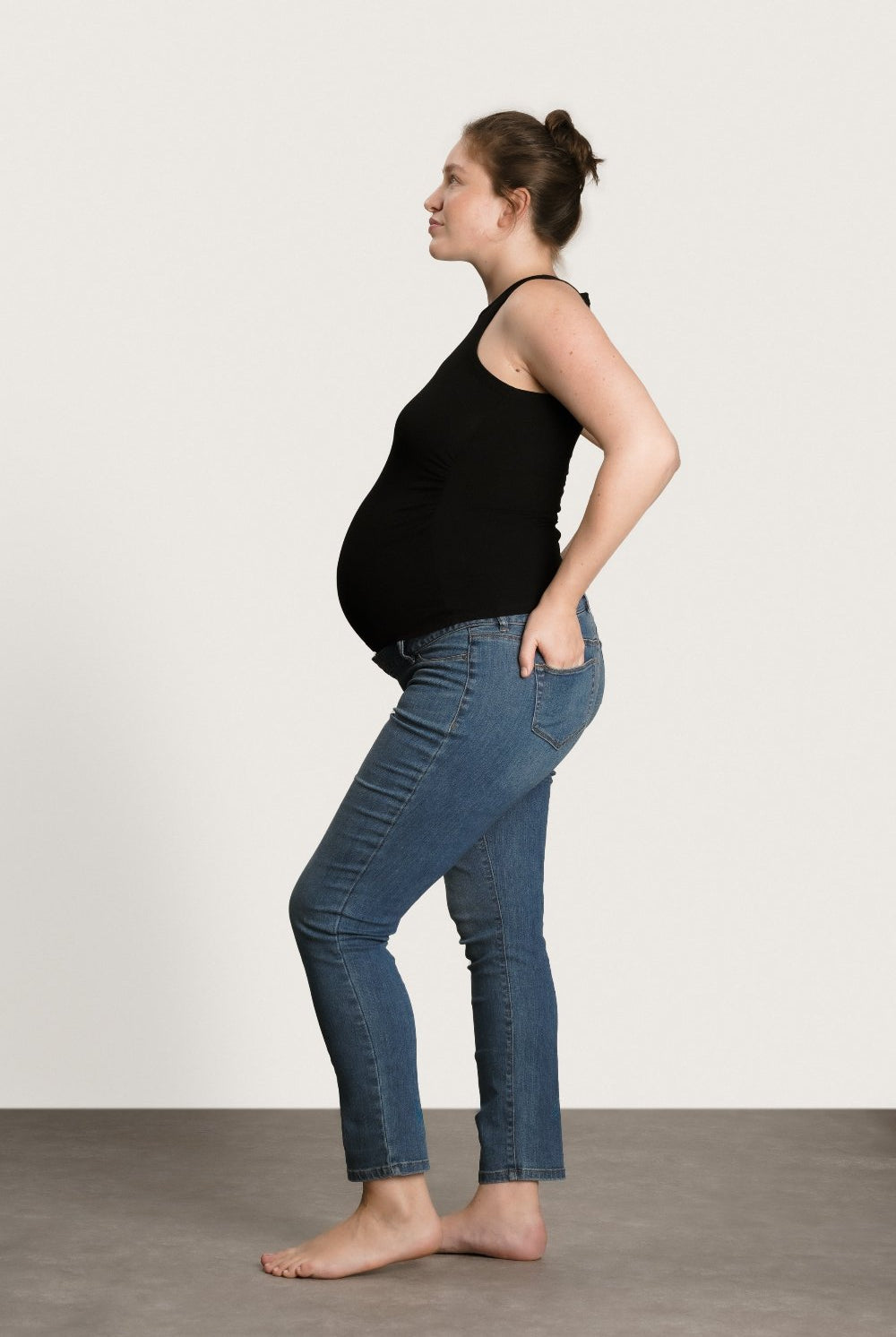We were thrilled when the hosts of the Down To Birth podcast Trisha Ludwig and Cynthia Overgard asked us to sponsor their show. In honor of this year's C-Section Awareness month, we invited Trisha and Cynthia along with NOM CEO and Creative Director (and 2 times c-section Mama), to share their insights on how mothers can best feel prepared for the possibility of cesarean delivery and some tips on post-surgery recovery. If you missed the live conversation, read on for our favorite highlights.
Tell us a little about what you do:
TL: I am a home-birth midwife by training. I went to Yale school of nursing, and got my Masters degree there. I didn’t ever intend to do home birth, but when I had my first baby I had very few options other than the University hospital, which wasn’t going to work for me. Many people find their way to home-birth for the same reason, they have limited options. Home-birth was the only way that I was going to feel best in practice as a midwife.
CO: I’m in this work not as a midwife, but a child-birth educator. I was once a very scared and overwhelmed mother. I have a background in Finance Education at the University of Connecticut, and I knew nothing about childbirth when I became pregnant. I took that overwhelm and just kept reading and learning. I ended up overcoming that fear with education. Through that I learned about hypnobirthing, and I birthed my son in 3 hours, from the very beginning to end, and 4 years later birthed my daughter at home. I met Tricia at my homebirth. I ended up resigning from my business life and becoming a hypnobirthing instructor, and I’ve taught over 2000 clients now. For reasons I cannot explain, cesarean and VBAC (Vaginal Birth After Cesarean) has always been close to my heart. I’m convinced that, in a former life, somehow it affected me deeply.
There are a lot of myths surrounding why c-sections are necessary. Are there any that we want to dispel from the get go?
TL: I think the first is just to say that c-section births are not the easy way out and it is not less work. It’s a hard process to go through. Any woman that has been through it can attest to the difficulty. It’s major surgery, it’s major recovery. A lot of people will say ,“You took the easy way out,” or “At least you didn’t have to go through the hard work of labor.” We would disagree with that.
JK: I think Anna would disagree also…
AC: Especially when you labor and get a c-section! Then you really do double the work.
TL: Absolutely, that’s a hard situation. I think the other thing too is that sometimes people will opt for a c-section. Sometimes that is their preference, and that’s fine. The reason that it is sometimes given is that the woman wants to protect her pelvic floor or doesn’t want to cause any damage to the vagina. Unfortunately, c-section being major surgery still has a lot of impact to the pelvic floor. I consider that a myth as well.
How do you support women who have either planned or need an emergency c-section in the work that you do?
CO: One of the other things that’s very important for everyone to understand is that C-Section is either a lifesaving procedure OR it is adding unnecessary risk to the mother and baby. It is one or the other. So, we want to reserve c-section for the lifesaving procedure it is, and absolutely avoid it in other instances if we can. Even if a mother chooses a c-section, she has the right to understand that. Typically, providers tend to overstate the amount of [c-sections that are elective]. It really is fewer than 10% they’ve found. Most [cesarean deliveries] are these emergency c-sections that are happening mid-birth.
Anna, even though you did go through labor, and you went through so much, I hope that you can take comfort in knowing that it really was better for your baby to experience that labor, it really was. I know you went through so much, but it is better for the baby when they go through some labor, actually.
I think the first thing, as always, is trust your provider. There is no greater anguish than a woman that goes through a c-section, and spends the rest of her life wondering if she needed it. That starts with trusting your provider.
Almost everything in a good childbirth education class will still provide as much to the woman that has a c-section, as the one that delivers vaginally: the breathing techniques, staying calm, understanding the questions to ask your provider, knowing your legal rights, making sure that you understand the role of everyone in the room, your right to bond with your baby immediately afterwards, all of those things can still be kept intact when you have a surgical birth.
TL: I think, honestly, the way that we prepare for a cesarean birth versus a vaginal birth, is quite similar, as Cynthia said. Even in the recovery, so many of the things are the same. There are some differences, of course, but a woman’s experience of a c-section is either going to be good or traumatic based on how she feels about the decision, and how well she felt supported going into the process of coming to that decision. That is all about her relationship with her provider, and how she’s treated throughout.
AC: With my first baby I was told I was going to have a c-section probably about half way through, based on uterus shape, and breached position. A midwife was never something that was introduced to me as an option for someone who knew they were going to have a c-section.
Can you talk about the benefits of having a midwife with you, even if you know you’re going to have a c-section?
TL: I think that it’s really about having that trusted person with you. In general, with midwifery care, you’re going to have a greater sense of continuity, hopefully a little bit of a deeper trusting relationship. Typically there’s more time spent in the prenatal appointments [with a midwife], so you’re going to get to know your midwife. If you’re planning a home-birth you might have hour long pre-natal appointments, as apposed to the average 7-15 minute visit in a standard OB practice. If you can have that trusted person by your side as you go through the process it just gives you so much reassurance along the way that every step in the journey is the right thing for you in that moment.
JK: It’s so hard to hold all of that information while you’re in labor!
TL: Yeah. And a doula can provide that too. It’s all about having that support person who knows your beliefs, your desires, who knows how to support you, and you feel confident in their decision making. I think so often the reason that women are traumatized by their c-section is because they feel it just happened to them. They didn’t know what was going on, and they just kept saying yes and yes and yes and yes and yes. They go down this cascade of interventions and suddenly you’re in the ER, and you wake up and your baby’s not there and then you have to process what happened.
AC: I can definitely relate to that, particularly as someone who’s had both an emergency c-section and a planned c-section. When you’re in labor or even when it’s planned, when you’re in that hospital room, there is a lot more information coming at you. [It's so important] having someone there that you trust. I think had I had that, it would have been a much more positive experience for me.
TL: We actually just had someone who is part of our community share with us that she had had a home-birth, a hospital birth, and she had just had a c-section. And her c-section was just as good and joyous of an occasion as her home-birth was. They were on equal levels to her, and the reason was she felt supported, respected, she felt she had a relationship with her provider, she felt all of the decisions came from her, and she put those two birth experience on par with each other. So that says a lot about what it can be.
AC: That’s amazing.
Which leads us into our next topic, what questions are most important for mothers to make sure that they ask their doctors or providers ahead of time to best prepare them for birth?
CO: Before I forget we have some episodes dedicated directly to this! Episode 13 is the top questions to ask your provider.
If you are the kind of woman who is looking to avoid an unnecessary cesarean, one of the best questions you can ask your doctor, when you’re informed, is “What are some of the reasons why you give a cesarean section?” Because, when you’re informed, you know how to interpret that response. If they say, “Well, I don’t like to see a woman go past 41 weeks,” that’s a red flag. If they say “Failure to progress,” like my dr. had said to me, “I’m going to need to see you dilated a centimeter per hour,” that is not evidence based... That is where we see this being introduced unnecessarily to mother and baby. If they mention things like, “Well, sometimes the baby isn’t well positioned and it’s really the safer course of action,” that is correct. Or “Placenta Previa, or sometimes we see [Umbilical] Cord Prolapse.” If they can actually name evidence based reasons why we can be grateful for this surgery, I feel like that’s the starting place. Understand why they typically give them.
And, get a sense of their tone, are they nonchalante? Are they like “Look, what matters here is a healthy outcome.” Who’s going to say that’s not what matters here? – We call that rhetoric. That’s not what we’re talking about here. Yes, that is, without question, the most important outcome. It is by no means the only important outcome. That’s really what our work is about; a healthy mom and baby is not all that matters. It’s the most important thing, the whole world agrees on that, but we think so many other things also matter. In that discussion [with your doctor], get a sense of if they respect that this is a big deal to you? We shouldn’t expect women to go through it as if it isn’t! We shouldn’t be nonchalant about it. These [birthing] women need so much emotional support. They need to be heard, they need to feel it’s necessary. If they feel it’s necessary, they can be deeply grateful for the procedure. That’s how they deserve to feel – grateful for it.
Those open-ended questions are where you want to go typically.
TL: I think another important question to ask is how often they support unmedicated or physiologic birth? Because, if you have a provider who 90% of their practice is epidurals and inductions, they’re 1. Going to have a higher rate of c-section, but 2. And more importantly, they really don’t know how to support a woman through physiologic birth. It’s a different job, it’s a different experience. If they don’t do it, then their ‘circle of safety’ is going to be smaller. You don’t actually want that in birth, because we can make that ‘circle of safety’ so small that anything that deviates from ‘normal,’ but really is just a variation of normal, is going to get you back into the OR. [Doctors] need to have skills, experience, and trust with attending physiologic birth.
Do you have any resources for expecting mothers to help them find a team trust or are there ways to go about that search?
TL: Our podcast!
CO: I think we often think of asking a friend or a sister who they gave birth with, and I don’t think that typically works out well, at least for my clients who are attracted to the kind of work that we support. Because, how your friends, or your work colleague gave birth, might not be how you want to give birth. But, how they gave birth, is likely the norm for the provider that they went to. You want to raise the bar as high as possible.
If you are taking a childbirth class, or if you are hiring a doula, and we hope that you are looking into those things, ask those people. They have access to maybe 100s of birth experience, and they can say, "Check these things out." I can name multiple providers in my area that have been so right for some people, but have been so wrong for others, so it’s never for me to presume and say, “This is a good provider for you.” Only you know. Go check it out, go interview them, see how your intuition feels. When you walk in and labor, and see their face, you should feel like you’re just going to utterly relax. Only that woman knows if she feels that way. She just has to do the leg work. She has to go on all the meet and greats. Every time you’re at a pre-natal, your entire pregnancy, even after you’ve found that right provider, or you think you have, consider every pre-natal an interview. Everything you’re sitting there with them, think, “I’m the hiring manager.” Put yourself in that position of being the hiring manager. It changes everything.
TL: Just to add to that, in that episode Cynthia mentioned, #103 (Giving Birth Like A Feminist), one of the things we mention is, when you leave your prenatal visit, check in with yourself. How do you feel? Try to get out of your head. Try not to be analyzing what they said, or thinking about the next appointment, or whatever was the topic of discussion you have to decide before the next one… Try to get more into your body and how did you feel when you left? Did you walk out of there and feel a little sad? A little embarrassed maybe? A little rejected? Feel a little unsupported? If you’re having those feelings consistently then you should probably move on to another provider. It’s just like a relationship. It’s a very important relationship.
CO: Exactly! And it’s easy if you ask yourself how you feel before you get out of the car and walk in. Say, “How do I feel before I show up?” Because I used to show up so excited for all of my prenatals. I was so happy those mornings. I would go there, and walk out, and I would just be praying. “Oh my god, please let the baby be ok.” Because the doctor scared me every time. But sometimes you show up scared – you’re anxious, you’re worried about something, you have a question, and you walk out sighing in relief because everything’s fine. Make that comparison between your arrival and your departure. How did I feel when I showed up? And how did I feel when I’m leaving?
I also want to mention we have 3 provider “Red Flag” episodes, we did a series. [There are] red flags for your first, second and third trimesters, which we really recommend as well.
AC: I have to say, I changed my provider at about 7 months, and I was really nervous to do it. I had those feelings the whole time, and I just decided I can’t go through labor with this person, it just didn’t feel right to me. I was kind of mortified to make that switch, but after doing it was so relieved. I also realized that this happens all the time. For any moms-to-be out there, if you’re having that same stress about not wanting to feel like I’m rejecting this doctor, it seems like that’s a very normal process and they don’t take that personally.
TL: You know, they might! Some of them might, but some of them don’t even notice. If you’re tight and it’s been your midwife for years or it’s been your gynecologist since you were 18, then it might be a little bit harder of a relationship to leave, but we have to check in with ourselves and ask ourselves, “Why are we prioritizing their feelings over ours?”
CO: We have to remember our loyalty is to our baby. Our loyalty is to ourselves, it is not to the provider. It is a professional relationship, and you don’t even have to break up with them. You just simply don’t make another appointment, and your next pre-natal you go elsewhere. They probably will not miss you. It’s important to hear that, because women feel guilty. They feel sorry and guilty. What are you sorry about? You’re doing the right thing for yourself and your baby. That’s all that matters.
We’d love to know what you suggest for post-op recovery and best practices after a c-section?
TL: It’s not tremendously different than vaginal birth recovery. We still really recommend that you have your baby skin to skin with you as soon as possible. It may be more delayed with a c-section. If you can have what people call a “gentle cesarean,” where the baby is placed skin to skin with you immediately after, that’s ideal. Early initiation of breast feeding is still really important. You may need a little bit of extra support because the abdomen is, obviously, going to be very tender and sensitive and so positioning is going to be different. Breastfeeding is still going to be important for helping your uterus do its job post birth, whether vaginal or by c-section. You’re going to need that oxytocin working to get the uterus to clamp down and slow down your bleeding. Now you have more than one place where you can bleed from, after a c-section.
CO: This whole notion of a vaginal delivery recovery requiring 6 weeks, and a surgical birth 8 weeks is just completely false. Recovery is a months’ long process and we should not remotely think that we are ready to get back to exercise, sex, normal activities. I think the expectations just hurt women so much.
Also to reiterate what Tricia said earlier, that your pelvic floor was impacted. Pelvic floor specialists are doing such good work in getting women through much healthier and safer c-section recoveries. One of the most important things to understand is that your [delivery] provider, no matter how well they served you, they simply didn’t learn any of that stuff. So, when they look at you and say “Everything is fine, you’re good to go,” the bar is really, really low. They’re not seeing a crisis. The bar can be so much higher when you go to a pelvic floor specialist who can help you with scar tissue, all of your recovery, the whole strength of the pelvic floor, the Diastasis Recti, any incontinence issues, painful sex, it’s all out there for the taking, in the area of self care. I wish that were common knowledge. We look at these providers like they’re the be-all, end-all, and have the final say, but the truth is they learn this narrow craft, and they don’t learn about breastfeeding, and they don’t learn about nutrition, and they don’t learn about the pelvic floor, they don’t learn anything about perineal anxiety disorders. That’s ok, just know that and go to all of those other respected people who are there to support your recovery.
TL: I think it’s surprising for women when they might have some incontinence after a c-section, or painful sex or pelvic floor pain of any kind. They think that isn’t something they would experience with having a c-secion, but you absolutely can. Cynthia and I talk all of the time about the importance of taking a solid 2 weeks whether it’s after a vaginal birth or a cesarean birth, probably even a little bit longer for c-section Mamas – 2 weeks in bed. To be fully resting, where your only responsibility is to take care of your baby and your own rest. Specific to c-section birth, but also with vaginal birth sometimes, heavy lifting is not recommended, so it’s really important to have a support person available to help if you have another child. Definitely with a c-section scar you’re not meant to be picking up that child for a couple of weeks.
You also have the scar to tend to. That’s something that you just have to watch. There’s not a lot that you have to do, just keeping an eye to make sure that it doesn’t get infected, and then later once it’s all fully healed, doing some scar massage to help with some longer term healing. It’s not just the surface layer where the skin is stitched up. There are multiple layers underneath of muscle and fascia that has been stitched. The way that it heals in your body can sometimes be uncomfortable, so a little bit of scar massage can break up some of the adhesions and helps it heal faster, while protecting your core.
You can be traumatized with a vaginal birth also, but may women experience birth trauma with a c-section, especially if it’s an emergency or unexpected. As part of recover, understanding that those feelings might come up and it might be unexpected – you might not expect to feel so angry or sad or even a little bit of post traumatic stress can develop.
AC: I love what you said about all of these other providers and knowing who those people are, and accessing them after birth. I think you're right, the support for women from your typical provider is just so minimal, and is so much more focused on the baby than it is the mom.
Are there appointments that you would say, “Hey, just schedule these for 4 weeks after your due date, just to make sure that they’re on the books. We know that moms have so many other thing on their mind after birth. Are there any that moms can do to plan for that [postpartum] time?
TL: I would say definitely 2 appointments: one with a lactation consultant when your baby is two week of age. Hopefully they can come to you, in your home. We know that moms that have c-section births struggle more with breastfeeding initiation because it’s just more complicated; you don’t always have your baby with you, and that first hour is interrupted. Sometimes the medications used in c-section delay that and can delay your milk coming in. A lactation consultant, if your intention is to breastfeed, is definitely a good idea. Secondly would be a pelvic floor specialist sometime between 6 and 12 weeks. If that’s accessible to you it’s going to be nothing but helpful.
AC: I wish I had had that advice! I mean, it’s easier to cancel then to find a provider, schedule, all of those things.
TL: There’s nothing wrong with saying, “I don’t really have a problem, but I’m just here to make sure everything is ok.” A lot of times people feel embarrassed if they come and everything is fine, but there’s nothing wrong with checking in.
CO: I would add joining a postpartum support group. I think that that gets overlooked so often. I’ve run a weekly postpartum support group since 2015 and it’s truly a life changing experience when you’re in a professionally moderated group with other women who are up all night, and having the same petty arguments with their partners, and dealing with recovering and feeling the guilt that moms feel.
And while we’re talking about guilt and c-sections… I just wish the whole world would hear that the one thing I wish people would stop saying to women who’ve had either a c-section or a difficult birth is, “But you have this healthy baby now!” as if she has to be reminded that she was blessed with a healthy baby! The one thing that you never have to remind a mother is that she has a healthy baby in her arms. That’s where the guilt comes from. I know [it’s] coming from the right place – they’re trying to shift your focus, they’re trying to make you feel better, that’s not what women need. They need to feel validated; they need to feel that they didn’t have that satisfying experience, that even if they didn’t want it cognitively, every cell in their body was longing to have this birth experience. That’s how physiologic birth is. It’s a hormonal process, and it’s deeply satisfying. Sometimes women don’t know, when they were either induced or they’ve had a c-section, why they’re feeling so off. It’s because they didn’t have that experience. If they just have a place where they can talk about this – how their relationships and their life are changing, the guilt, the stress, the not feeling like one’s self, maybe post-partum resentment and rage, all of these things are normal. Just to have an outlet to be able to talk about it is so important.
Anna, having gone through two C-Sections yourself. Are there any apparel choices you made in our recovery that you can share with our moms?
AC: Yes! A lot of NOM Maternity is designed from my own experience. I’ve owned a retail store that sells apparel for mom and baby, for a very, very long time before I purchased NOM about 5 years ago. I really struggled to find clothing that was fashionable, that still felt like me, and that was functional. That element of being able to breastfeed after, in the same clothing, was really important. That’s how a lot of NOM clothing is designed.
Our lounge collection I lived in. The Max pant is great [for c-section]. It has a fold over waist, so it’s great while you’re pregnant. You can pull it up over your stomach. For me, who went through two c-sections, that really soft fabric was really nice, and then I could fold it down under my c-section. The Rhys nursing top has a snap front. It’s a super cute set. With my first baby, before Covid, we had a lot of visitors all of the time, so it was a great little set that I felt comfortable in, but I could also host people over. It also comes with a little robe. That was a set that I wore all of the time. And the Francesca jumpsuit. It’s our #1 seller for a reason. This baby is so comfortable when you’re pregnant, it’s so good for nursing, it’s really cute postpartum. I felt not great about my body for a really long time. I was not one of those people that felt sexy while I was pregnant. And that was the one piece of clothing I could put on and be like, “Ok, I feel cute.” And that’s really important! You’re going through so many changes, and to feel good in your body is hard. I think that you just need to find a few pieces that you love, and those were by far my favorites.
TL: Do you guys make a birthing gown?
AC: We do! The Clementine nightie a lot of people birth in. It has a great little shelf bra with a snap front. So again, you can wear it for nursing afterwards. Plus, a little pleated back detail so it has feminine details. It’s really sweet and it’s great for birthing. I wore it a lot because I didn’t like to wear a bra at night, and it has a built in bra. You can put your breast pads in that and not have to wear a full blown bra at night.
TL: Perfect! We’re big fans of not wearing the hospital gown.
Thank you so much for sharing your wisdoms with us today. Any closing remarks that you’d like to leave our mothers with today?
TL: Mother’s should know that if they’re planning a c-section, or if they’re not planning a c-section and they end up with one, it’s a good idea to have some idea of what you want to happen post birth with a c-section so that you can still have some of the things that you maybe have wanted in your plan from a vaginal birth. Like delayed cord clamping, and like skin-to-skin, that having a c-section birth does not have to be a complete derailing of your birth expectations and experience.
CO: I would add something that we say at the end of every podcast episode: “Hear everyone, listen to yourself.” Most women go into this process asking all of their friends who have had a baby, their relatives who had a baby, they go to their provider with these trusting wide eyes, and then they start to educate themselves or they go to a childbirth class and they [no longer] know who to listen to. “Hear everyone, listen to yourself.” Just take it all in and listen to yourself. You start doing this at birth, and you’re going to need to rely on yourself and trust yourself and advocate for yourself, and listen to yourself as a mother. It’s your first experience of getting to practice doing that. We assure you, you’re going to be practicing that the rest of your life now that you’re a mother.
The final lesson, the ultimate lesson for a mother, is surrender. Once you’ve done the work, once you’ve done everything we can control - we surrender to that which is out of our control. So birth is just this beautiful experience of what motherhood is at large.




































































